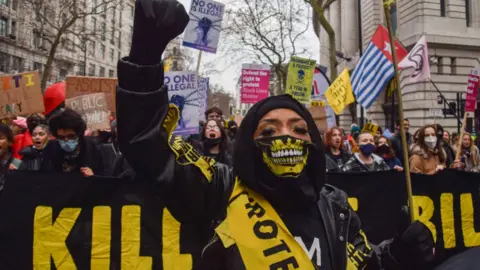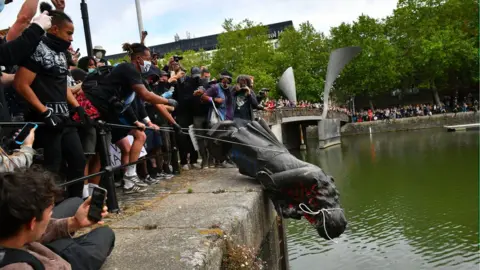What is the Police and Crime Bill and how will it change protests?
 Getty Images
Getty ImagesA series of controversial changes to the way protests are policed will shortly become UK law.
They are part of the Police, Crime, Sentencing and Courts Bill, which includes major government proposals on crime and justice in England and Wales.
The bill has passed through parliament and will receive royal assent to become law in the next few days.
What powers did police have before?
If the police want to restrict a protest, they generally have to show it may result in "serious public disorder, serious damage to property or serious disruption to the life of the community".
They can also impose specific measures on the routes of marches.
When it comes to major events, such as the COP26 protests, details around protests are typically agreed with the organisers weeks in advance.
How will the bill change those powers?
Police chiefs will be able to put more conditions on static protests, such as those organised by Extinction Rebellion where roads and bridges are occupied. They will be able to:
- Impose a start and finish time
- Set noise limits
- Apply these rules to a demonstration by just one person
So if a single individual was holding a placard while sharing their views via a loudspeaker, and refused to follow police directions about how they should conduct their protest, they could be fined up to £2,500.
It will also become a crime to fail to follow restrictions the protesters "ought" to have known about, even if they have not received a direct order from an officer.
Previously, police have needed to prove that protesters knew they had been told to move on, before they could be said to have broken the law.
The new law also includes an offence of "intentionally or recklessly causing public nuisance".
This is designed to stop people occupying public spaces, hanging off bridges or employing other similar tactics.
Another measure clarifies that damage to memorials could lead to up to 10 years in prison. This follows the toppling of the statue of slave trader Edward Colston in Bristol.
The four people who were accused of illegally removing the statue were cleared of criminal damage at Bristol Crown Court.
 PA Media
PA MediaWhat about human rights?
The right to protest and express yourself is enshrined in the Human Rights Act. The police have to show they have taken this into account.
But that right is not absolute. Protests can be limited by police if they believe they have good reason to impose restrictions on an event to ensure public safety, or to prevent crime.
The Home Office has insisted that the bill respects human rights.
But the history of public protest is littered with long and complex legal battles over whether police have used their powers properly.
One of the most important cases - about the police's power to contain a crowd for an indefinite period - took 11 years of courtroom arguments before concluding that the tactic was lawful.
What have critics said about the bill?
After the bill passed through parliament, the CEO of Amnesty International UK Sacha Deshmukh said:
"The Policing Bill is part of a hugely worrying and widespread attack on human rights from across Government which will not only see basic rights reduced across the board, but will also strip people of the means to challenge or contest their treatment."
Shadow home secretary Yvette Cooper described the legislation as "rushed" and will create "incredibly widely-drawn" powers, which will allow the police to "stop and search anyone in the vicinity of a protest, including passers-by, people on the way to work and peaceful protesters".
In its reports on the bill, Parliament's Joint Committee on Human Rights said the proposals are "oppressive and wrong". It accuses the government of trying to create "new powers in areas where the police already have access to powers and offences which are perfectly adequate".
The campaign group Rights of Women has also criticised for the bill for failing to introduce long-called-for measures that it says would reduce violence against women and girls. MPs had previously voted to scrap a proposal by the Lords to make misogyny a hate crime as part of the legislation.
However, the government argues that other parts of the legislation toughen sentencing for serious violent and sexual offences and introduce new police bail rules for suspects under investigation.
What other laws will the bill introduce?
- Higher maximum penalties will be introduced for child cruelty offences
- Domestic abuse victims will be given more time to report incidents of common assault or battery
- Mandatory life sentences for anyone convicted of killing an emergency worker whilst committing a crime
- On terrorism, the bill will create powers to more closely monitor offenders released from prison
- Community sentences for less serious crime will address underlying problems in offenders' lives
- Changes to sexual offences law will tackle abusive adults in positions of trust, such as sports coaches and religious figures
